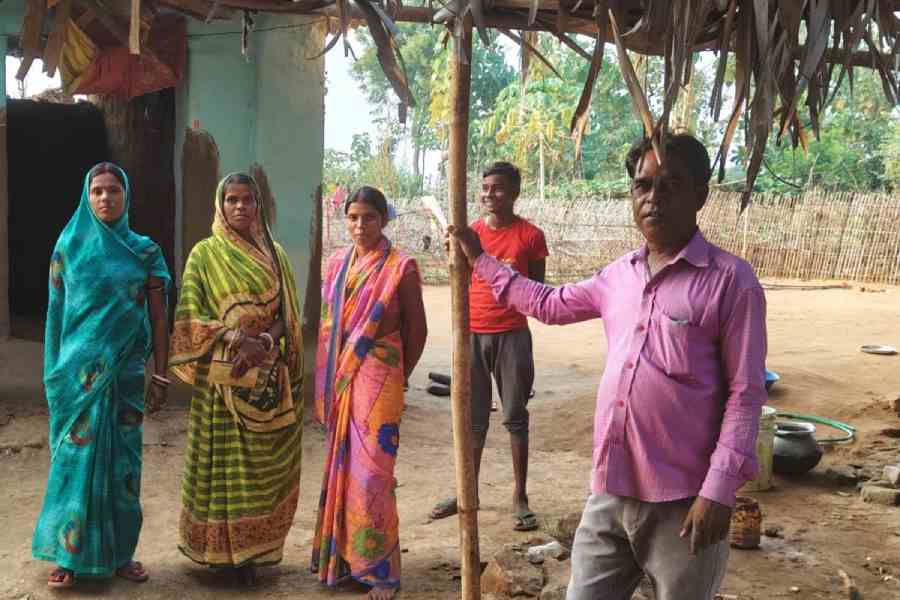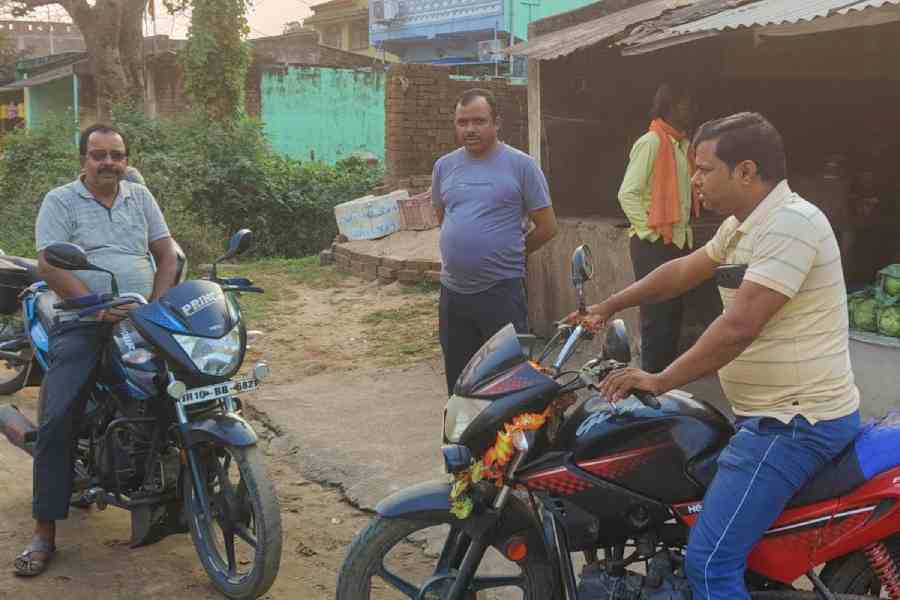While money matters in elections, the money matters of voters have evoked little interest in political parties in Jharkhand.
New technology and the greater enforcement of financial probity norms have created a Kafkaesque labyrinth for the people here. But the absence of any political discourse on this has left voters and even political activists helpless in resolving the mess.
It’s taken around five months for most customers of the Bank of India’s Keliasole branch in Nirsa constituency to get their re-KYC done. KYC norms mandate the re-verification of a customer’s details every few years depending on the level of risk associated with them.
Small savings accounts come under the low-risk category, for which verification happens every 10 years.
“I ran to the bank many times as the KYC was not happening because of some spelling error. After a few months, the manager told me and others to file affidavits with the correct spellings and submit that as proof,” farmer Samir Mondal told The Telegraph.
“It costs ₹500 per affidavit. For about five months, I could not use my account. I bought on credit from shops, but some shopkeepers too had their accounts stalled and so needed cash as well.”
Asked if they had reported this to public representatives, another farmer, Kishore Mondal, said: “Political leaders humiliate us saying these are problems caused by our own carelessness. How is it our fault? It’s our hard-earned money. The government runs the banks. Shouldn’t the MLA (the BJP’s Aparna Sengupta) or MP (the BJP’s Dulu Mahato) do something?”

Mandodari Devi (centre) and Ganesh Pandit (in pink shirt) at Pargodih in Dumka district. Pheroze L. Vincent
Kishore’s problem with the bank is more serious. “A sum of ₹36,000 vanished; I don’t know how. When I complained, the manager said it was TDS and asked me to file my IT returns. I said I am a small farmer; my income is too low to be taxed.”
A survey of 244 households last month in seven villages of the Latehar and Lohardaga districts, by the NREGA Sahayata Kendra group of NGOs with Ranchi-based economist Jean Dreze among the organisers, found that 60 per cent of them had at least one frozen bank account. Some households had all their accounts frozen.
Medininagar-based activist James Herenj explained: “The Bank of India allows people with wrong spellings in their identity cards to submit affidavits showing their correct spellings. Many other banks don’t allow this and insist on (the clients) correcting the identity certificates first. This takes even longer and people are left without access to banking as their accounts get blocked.”
Herenj said a bank manager had told him that the backlog was a result of many Jan Dhan accounts having come up for re-KYC this year, a decade after they were opened. Some had crossed their ₹50,000 balance limit and therefore required more procedures for verification.
Some were declared inoperative because of the absence of withdrawals for more than two years — although the accounts of direct-benefit-transfer beneficiaries, such as NREGA workers, are supposed to be exempt from this regulation.
“This is not a political issue as there is hardly any media coverage. The people suffer silently. This happens the most in Dalit or tribal-populated villages, where they have poorer access to information and are not very educated,” Herenj said.
In Bishunpur, Gumla district, a woman named Anjilina Thithio had given up on retrieving her savings after her account got blocked.
“She had gone to the bank three or four times and said they did not speak properly to her. When we met the manager, we found that her KYC had been completed and the account restored, but she had not been informed,” Herenj said.
“Banks exist because of customers and not the other way round. The bankers’ mentality needs to change.”
Every day spent at a bank means the loss of a day’s wages, which leads to some customers having to skip meals to get their KYC in order.
“Most banks insist on complete linking with Aadhaar. NREGA accounts were opened before Aadhaar,” Dreze told this newspaper.
“(The) UIDAI has gradually restricted the ability (of people) to make changes (to their Aadhaar details, by shutting several enrolment centres) so people often need to go to the district headquarters to make the change. Once the Aadhaar is corrected, then other documents that used the wrong spelling have to be changed. This is never-ending.”
A bank manager in Deoghar said: “Customer data was earlier collected in hard copy. Now it all needs to be linked to the centralised KYC databases.
The websites are slow and sometimes customers need to be told to return later.
“Every bank has one person dedicated to KYC work alone. Even if all the staff work 24 hours, the backlog can’t be cleared fast as there is not enough staff in the small branches and they have other tasks to do as well.
“Our customers increase every day, the staff strength does not. Customers often ignore the SMS they get for KYC (updates) and their accounts automatically get blocked.”
Gomeshwar Soren, a JMM activist in Nala constituency, said: “Almost every Adivasi village here has this problem. As political activists, we don’t know what to do. Bank officials point at the computer and say that it decides everything, they don’t.”
Ganesh Pandit of Agoiabandh village in Jarmundi constituency has had to do his KYC thrice in the last nine months at the Indian Bank branch in Beldih, Deoghar district, around 16km away.
“Every time I need money, they make me do the KYC and give the money. After some time, the KYC gets rejected. Then, when I need money again, I have to repeat the process,” Pandit said.
His home branch is in Pargodih, which is closer to his home but where the KYC queue is too long.
Ironically, the bank itself uses two different spellings: Pargodih on the passbook and Pargodi on its website.
In the Pargodih branch, marginal farmer Mandodari Devi’s KYC has worked but she can’t access her money. Her passbook shows the credit of an agricultural loan of ₹60,000 in 2021. She says the loan was only for ₹50,000 and that bank agents (rural banking representatives) had told her that it had been waived a couple of years ago.
“I had already paid back ₹6,000 when the loan was waived. Now the manager says I have to repay the loan and until then I can’t withdraw my NREGA wages or the Maiya Samman (monthly dole of ₹1,000),” she said.
“There has been no rain for two years. How will we repay the loan? And why should we when it was waived?”
Asked whether the local politicians helped, a neighbour of Mandodari replied: “They only come for votes, not to solve our problems.”
Nirsa, Nala and Jarmundi vote on November 20










